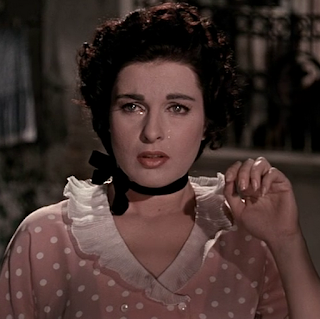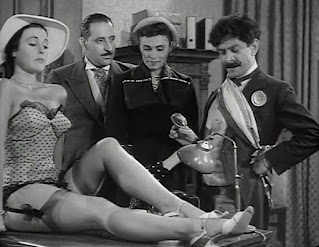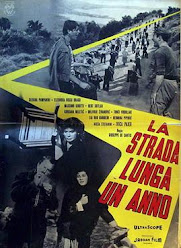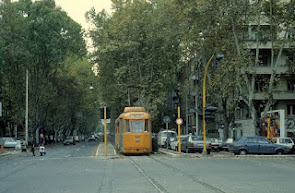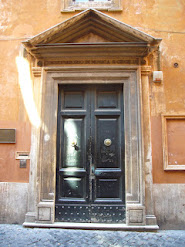Talented star with taste for high life
The actor Walter Chiari, whose passionate affair with the American superstar Ava Gardner in 1950s Rome is said to have influenced Federico Fellini in the making of his landmark movie La dolce vita, was born on this day in 1924 in Verona.
Walter Chiari had the bonus of
good looks on top of acting talent
Chiari was an accomplished stage and film actor when he met Gardner on the set of The Little Hut, a 1957 romantic comedy that was British made and with a Canadian director but was filmed largely at Cinecittà in Rome.
Gardner was still married to Frank Sinatra at the time but the pair were estranged and she was open to romance. She developed a taste for the Rome nightlife around the Via Vittorio Veneto and her relationship with the handsome Chiari soon began to dominate the gossip columns. They were constantly harassed by photographers, some of whom felt the rough edge of Chiari’s temper.
Fellini supposedly based Paparazzo, the photographer who relentlessly pursues Anita Ekberg’s character in La dolce vita, on the antics of some of the real-life snappers who followed Chiari and Gardner’s every move.
Chiari, who enjoyed much success on screen and in theatre, mostly in comedy roles, was already a high-profile figure in Rome’s glitzier clubs and bars, often stepping out with glamorous partners. Among those with whom he was romantically linked were actresses Elsa Martinelli, Silvana Pampanini and Lucia Bosè, and the pop star Mina. He reportedly had a brief fling with Ekberg herself.
In his professional life, he was best known for his film roles in the aforementioned The Little Hut (1957), Bonjour Tristesse (1958), Chimes at Midnight (1966) and The Valachi Papers (1972), which brought him international acclaim.
He appeared opposite Anna Magnani in Luchino Visconti's film Bellissima (1951), won much praise for the quality of his performances in the commedia all’italiana genre and worked with some of Italy’s leading directors, including Mario Soldati, Mario Monicelli, Luigi Comencini, Ettore Scola, Dino Risi, Alessandro Blasetti and Damiano Damiani.
 |
| Chiari's relationship with the American star Ava Gardner (left) dominated the gossip columns |
He starred in an Italian production of Neil Simon’s The Odd Couple and, towards the end of his career, won critical approval for his performances in more serious stage roles, in plays such as Marc Terrier’s Six Heures au Plus Tard, Samuel Beckett’s Endgame and Richard Sheridan’s The Critic.
Born Walter Michele Armando Annicchiarico, Chiari spent the early part of his childhood in Via Quattro Spade in the heart of historic Verona, where his father, Carmelo, originally from Puglia, worked as a security officer for the local authority.
On finishing school he took a job as a warehouseman at a car factory in Milan, where the family had moved when he was nine. He subsequently found work as a radio technician and a bank, where - already showing a talent for acting - he was sacked after imitating Adolf Hitler while standing on a desk.
His break in acting came on a night out at the Teatro Olimpia in Milan, when the revue he had gone to see with a group of friends was on the point of being cancelled because one of the actors was absent. Urged to volunteer as a stand-in by his friends, he so impressed the director that he was invited to join the company.
 |
| Chiari had a brief marriage to the actress Alida Chelli between 1969 and 1972 |
Apart from his regular appearances in the gossip pages, Chiari was at the centre of other scandals. In 1970 he spent 98 days in the Regina Coeli prison in Rome after being arrested on charges of cocaine use and cocaine trafficking. He was released on payment of three million lire bail and acquitted of all but the possession charge at trial in 1971.
He received a suspended sentence for possession, but even though he had been cleared of the more serious charges the scandal severely damaged his career. The national TV channel Rai dropped him from a number of shows in which he had participated and until the late stages of his career his only television work was for minor, regional channels.
After his death, it was revealed that he had served for part of World War Two in the German army, who posted him to northern France with an anti-aircraft unit. He was captured by the Allies after being wounded soon after the D-Day landings and sent to an American prisoner of war camp in Tuscany.
Chiari was married - once and for just three years - to the singer and actress Alida Chelli. They had a son, Simone Annicchiarico, who became a TV presenter. Chiari died from a heart attack in Milan in 1991, at the age of 67. His funeral, attended by more than 3,000 people, took place at the church of San Pietro in Sala, near Milan’s Teatro Nazionale.
His tombstone in Milan’s monumental cemetery famously is inscribed with the words: "Don't worry, I'm merely catching up with sleep".
Travel tip:.jpg)
The Via Quattro Spade in Verona,
where Walter Chiari was born
Verona, where Walter Chiari was born, is the third largest city in the northeast of Italy, with a population across its whole urban area of more than 700,000. Among its wealth of tourist attractions is the Roman amphitheatre known as L’Arena di Verona, which dates back to AD30. Just a five-minute walk from Chiari’s home in Via Quattro Spade, the arena has a seating capacity of 22,000, often selling out for open air opera performances and pop concerts. Verona was chosen as the setting for three plays by William Shakespeare – Romeo and Juliet, The Two Gentlemen of Verona and The Taming of the Shrew - although it is unknown whether the English playwright ever actually set foot in the city. Each year, thousands of tourists visit a 13th century house in Verona where Juliet is said to have lived, even though there is no evidence that Juliet and Romeo actually existed and the balcony said to have inspired Shakespeare’s imagination was not added until the early 20th century.
Travel tip:
The church of San Pietro in Sala in the Wagner
district of Milan, which held Chiari's funeral
The church of San Pietro in Sala is in the well-heeled Wagner district of Milan, which has some expensive apartments and upmarket shops but is also seen as a trendy neighbourhood. The main shopping streets, Corso Vercelli and Via Belfiore, are lined with quirky boutiques and shoe shops, while the area has a lively vibe in the evening. One attraction is the indoor food market in Piazza Riccardo Wagner, directly opposite the church. The largest food market in Milan, it stocks all manner of gourmet treats and is not to be missed by food-loving visitors to the city. Situated about 3km (1.9 miles) west of the centre of Milan, a 15-minute Metro ride from the station in Piazza Duomo.
Also on this day:
La Festa della Donna - International Women’s Day
1566: The birth of composer Carlo Gesualdo
1925: The birth of priest and politician Gianni Baget Bozzo
1949: The birth of singer-songwriter Antonello Venditti
